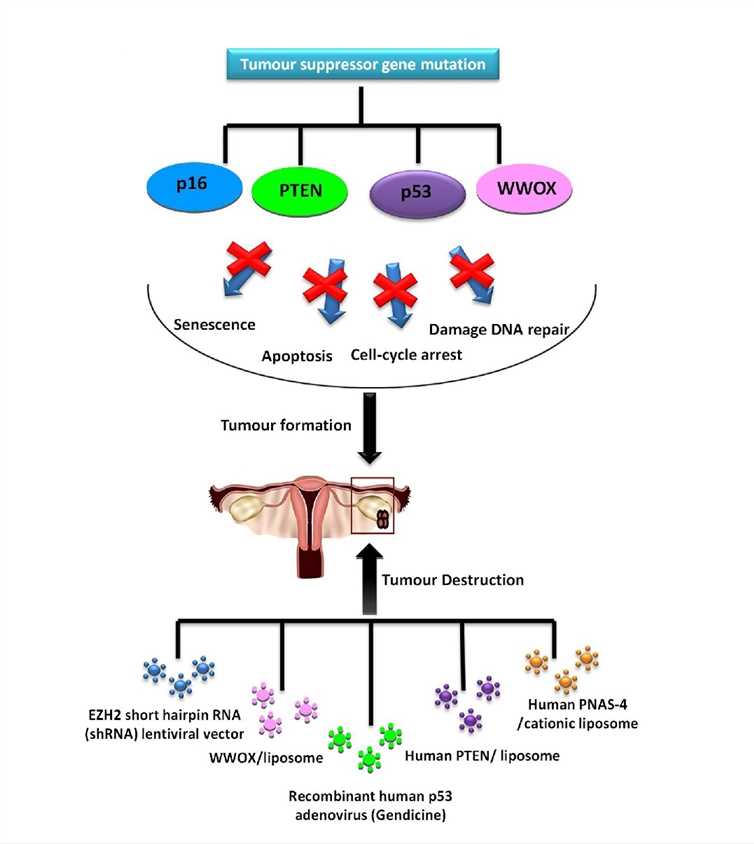Epithelial Tumor-targeting Adenovirus Vector Construction Service
Epithelial cancers are most common among women of all racial/ethnic groups. Epithelial cancers are classified by tumor cell histology as serous (52%), endometrioid (10%), mucinous (6%), or clear cell (6%), with one-quarter classified as unspecified subtypes. Gene therapy presents unique opportunities for extending the spectrum of epithelial cancer treatment possibilities, either alone or in combination with conventional therapy. Creative Biolabs is dedicated to establishing the most exquisite service platform for our clients and the one-stop adenovirus vector construction services can provide comprehensive technical support for the treatment of human diseases.
Introduction of Genes of Epithelial Tumor
One of the most studied tumors suppressor genes in epithelial cancer is p53, a protein with a wide variety of anticancer functions, thus it is involved in response to DNA-damaging, apoptosis and cell cycle and growth arrest. In a high percentage of epithelial tumors, there is a loss of p53 function. Many gene therapy approaches have focused on the role of p53 mutation, with good results both in vitro and in vivo. Furthermore, studies showed that adenovirus-p53 infection is an effective method to activate the apoptosis of cancer cells and re-sensitize the resistant epithelial ovarian cells to taxol, mediated by p53 upregulated modulator of apoptosis, the direct downstream pro-apoptotic effector of p53. Another tumors suppressor gene is p16, whose upregulation in epithelial ovarian tumors was demonstrated to reduce the proliferation of ovarian tumor cells by downregulation of eukaryotic translation elongation factor 1α2 protein (eEF1A2). Scientists showed that EZH2, a histone methyltransferase, negatively regulates the expression of p16, and its inhibition reduces cell proliferation and migration in vitro and suppresses ovarian tumor formation in vivo. In addition, WW domain-containing oxidoreductase (WWOX) gene has been identified as a tumor suppressor gene and its expression has been shown to be reduced or absent in ovarian epithelial tumors. The expression of WWOX gene in epithelial ovarian cell induces apoptosis and inhibits cell proliferation both in differentiated tumor cells and in cancer stem cells.
 Figure 1. The role of suppressor genes in epithelial tumors. (Áyen, 2018)
Figure 1. The role of suppressor genes in epithelial tumors. (Áyen, 2018)
Service
Clinical trials of gene therapy for epithelial tumor have highlighted the potential benefits of this treatment. The major challenges to the translation of gene therapy technology to humans are development of better vectors and epithelial cancer-specific gene targets. Therefore, we offer a variety of adenovirus vector construction services, including adenoviral transduction of epithelial ovarian cells with the gene p53, p16, and WWOX.
Creative Biolabs has focused on the development of gene therapies for years. We whole-heartedly cooperate with you to accomplish our shared goals. Our team provides you with outstanding support and meets your specific needs with a professional technology platform. If you are interested in our services, please contact us or send an inquiry.
Reference
- Áeyn, Á.; et al. (2018). Recent progress in gene therapy for ovarian cancer. International Journal of Molecular Sciences. 19(7):1930-1959. Distributed under Open Access license CC BY 4.0, without modification.
